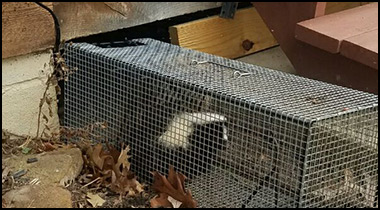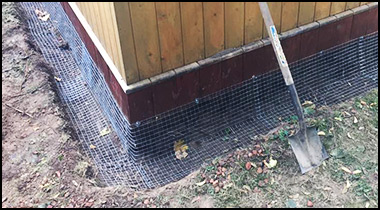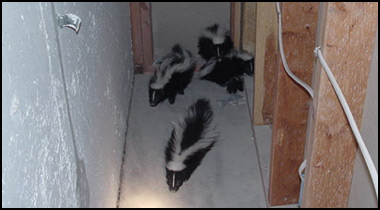Bridgeport Skunk Removal Resources
Skunk Rehabber - Gayle Molloy-Barbour: 203-214-7427
Free Fairfield County Animal Services: 203-576-7727
Humane Wildlife Trappers of Bridgeport: 203-635-4650
If you need skunk control in Bridgeport, you have a few options. First, you can attempt to solve the skunk problem yourself by reading our do-it-yourself guide. If you need outside help, you can also call Fairfield County Animal Services to see if they have any free resources or help for you - however, they primarily deal with dog and cat concerns. You can also call a local Bridgeport wildlife rehabber, as they are typically a great resource for advice that is in the best welfare of the animal. If as a last resort you must hire a professional company, we recommend Humane Wildlife Trappers of Bridgeport at 203-635-4650. To learn more about them or check their skunk removal prices, visit bridgeportpestanimal.com.

Bridgeport Skunk Trapping and Removal

Preventative Repairs & Exclusion

Bridgeport Skunk Removal From Structures
In many cases, preventative measures can solve your Bridgeport skunk problem - keep garbage secured, pet food indoors, and most of all when it comes to skunks, secure the perimeter of your shed, porch, deck, or house with a barrier - lattice or steel mesh is good, and it keeps Connecticut skunks from going under the structure. If trapping and removal of the skunk is the only option you have, please do so with the help of a local agency or professional company who knows how to do it humanely and legally. Browse the resources of this site for more educational information.
Frequently Asked Questions:
Prevention: How to Keep Skunks Away
What to do with a skunk after I catch it?
Is it legal for me to trap a skunk?
How to remove skunk odor
Is a skunk active during the daytime rabid?
What does skunk feces look like?
Bridgeport Skunk Control Information: Do skunks kill chickens?
If you raise poultry and are having troubles with a wild animal killing them, you want to determine what it is. If you smell sulphur like stench, you might suspect a skunk, but before you go after every stripped critter you see, here are some facts about skunks and their eating habits. Skunks are opportunistic eaters, enjoying plants, animals, and fungi. They most often eat fruits, and vegetables as well as nuts, and roots. They have been known to eat bugs and their and larvae, small mammals, snakes, worms, many amphibians and eggs. They retrieve their food by using their strong front claws to dig and scratch their food from the ground, tree stumps and other places. Skunks eating habits will change with the seasons. They also modify their diets according to what is available in the area.
Another favorite food of Skunks is honeybees. Because of their dense fur they are able to enjoy a meal of bees without getting stung. A Skunk is crepuscular which means it prefers to forage for food at dusk and dawn. All types of skunks eat a similar diet. Their diet is dependent on area and season, not type of skunk. Roughly 70percent of their entire diet consists of insects. Apart from honey bees, they often ravage ant hills for a tasty snack as well. When Skunks take up residence close to human neighborhoods, they often wander into yards with garbage cans, unattended feed bins, garages and other areas where you might keep your pets food.
Skunks are often guilty of digging in homeowner's lawns or gardens in search of their favorite foods such as grubs or worms. If they are really hungry, they have been known to eat dead birds or rodents other predators. Skunks are more of an annoyance to your yard than a chicken predator. If it is convenient, they will go after chicks and love eggs of all kind, but rarely, if ever, attack a full grown bird. They are crepuscular by nature, and have extremely poor eyesight. If a skunk happens to gain access to a coop, it will always go after eggs first
Remember, for free services you can try 203-214-7427 or 203-576-7727, but if you need to pay for professional help, check the prices at the bridgeportpestanimal.com website. Or follow our do-it-yourself guide!

